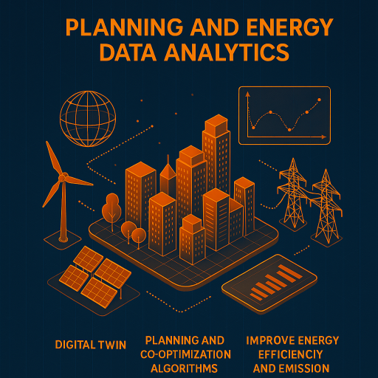WP 2: Planning & Energy Data-Analytics
Motivation
SeS are nonlinear, complex and interconnected by nature.
Automated design and analysis methods are required to capture the variety and many degrees of uncertainty.
Based on this framework, guidelines for the development of sector-coupled SESs can be derived.

Objectives
Develop a digital twin of complex SESs, with a focus on integrated electro-thermal distribution systems and heat pumps as the major climate-neutral power-to-heat technology.
Employ state-of-art algorithms to improve energy efficiency and emission, based on data learning (ML), reinforcement and imitation learning, and optimization.
Develop novel, robust planning and co-optimization algorithms, which are then to be integrated in an open-source software package for SESs.
Doctoral Candidates Involved in the WP

Personal background
Hasib has a background in mechanical engineering. He pursued a Master’s in Decentralised Smart Energy Systems, completing his first year at Université de Lorraine, France, and specializing in thermal energy engineering in his second year at Universitat Politècnica de Catalunya, Spain. Currently, he is working as a Marie-Curie fellow at VITO and enrolled as a PhD researcher at KU Leuven.
Research project
Title: Robust and optimal planning of district heating networks for next-generation energy systems.
Objectives: This PhD research aims to extend the PATHOPT framework by optimizing consumer connections, introducing a novel heat-zoning approach, enabling extension of the network and phased deployment, and enhancing the robustness of the district heating network under uncertainty to improve economic and operational efficiency.
Expected outcomes: The expected outcomes of this research include an enhanced PATHOPT framework with selective consumer connection capabilities, a robust uncertainty-aware district heating network planning approach that considers extension & phased development, and the validation of models using real-life case studies in Belgium.
Main affiliation
Supervisor team
Personal motivation
District heating can play a major role in decarbonization efforts, making it a crucial area for research. I am particularly inclined toward research that involves modeling and simulation as it eliminates the need for expensive experimental setups. This approach will also allow me to train and collaborate with researchers from developing countries, enabling them to contribute meaningfully to the field and promoting global collaboration in sustainable energy solutions.

Personal background
As a PhD student at ENERTRAG, I am currently pursuing a research project titled “Optimization of Costs and Availability of Green Hydrogen Production” under the supervision of Dr. Thomas Frenzel and Prof. Johannes Schiffer. My academic background includes a Master’s degree in Electrical and Electronics Engineering from Cukurova University, where I specialized in deep learning-based solar irradiation prediction. I hold a Bachelor’s degree in Electrical and Control Engineering from AAST University.
My primary research interests and focus areas include renewable energy forecasting, distributed system control, and green hydrogen operation optimization. These areas align with my goal of contributing to the advancement of sustainable energy solutions.
Research project
- Title: Optimization of costs and availability of green hydrogen production
- Objectives:
- Optimize Green Hydrogen Production Availability and Cost: Develop predictive models to optimize the availability and cost of green hydrogen production by leveraging forecasts of available renewable energy sources.
- Utilize real-time sensor data to detect anomalies and predict probable faults in the production system. By identifying potential issues early, this approach aims to enhance system reliability, reduce downtime, and improve overall operational efficiency.
Predictive Maintenance Using Sensor Data:
- Expected outcomes:
- Daily Optimal Scheduling for Green Hydrogen Production: Develop and generate daily schedules with a 15-minute time horizon for the optimal operation of green hydrogen production facilities.
- Fault Prediction Schedules for Enhanced Reliability: Create predictive fault schedules to ensure the reliability of the power system supporting green hydrogen production.
Optimization of Green Hydrogen Plant Fleets: Optimize the operation of fleets of green hydrogen plants connected to photovoltaic (PV) and solar systems.
Demand Scheduling for Diverse Hydrogen Consumers: Develop and satisfy demand schedules for three distinct categories of hydrogen consumers. This involves aligning production with varying demand profiles to ensure
Main affiliation
Supervisor team
Dr. Thomas Frenzel (ENERTRAG), Prof. Johnnes Schiffer (BTU, Fraunhofer IEG)
Personal motivation
My motivation for this project stems from a deep commitment to contributing to the next generation of energy transition. I am driven by the desire to ensure a sustainable supply of green energy that can effectively replace fossil fuels, thereby reducing their harmful environmental impacts. By optimizing green hydrogen production and integrating it with renewable energy sources, I aim to play a role in creating a cleaner, more sustainable energy future for generations to come.

Personal background
I am currently a doctoral candidate affiliated with the Technical University of Berlin and working in collaboration with Enersis Suisse AG. My research project, titled “Low Voltage Network Topology Reconstruction Using Advanced Data Analytics”, is supervised by Mr. Thomas Koller, Professor Manuela Kneiske, and Dr. Jan Steggemann. My interest in the energy transition was sparked during my undergraduate studies in Geology at the University of Birmingham. This interest deepened during the COVID-19 pandemic, when I began teaching myself programming and developed a growing passion for data science. To integrate these two fields, I pursued the MSc in Energy Systems and Data Analytics (ESDA) at University College London, where I acquired the necessary data analytical skills to address the complex challenges of the energy transition.
Research project
- Title: Low Voltage Network Topology Reconstruction using Advanced Data Analytics
- Objectives:
- Bridge the gap between academic research and industry practice by exposing the obstacles utilities face when reconstructing low-voltage network topologies with insufficient data.
- Develop methods to accurately and dynamically infer low-voltage grid topologies using limited data sources (e.g., GIS layouts, standard load profiles, substation measurements), without relying on smart meters or documented switching states.
- Identify which machine learning (ML), graph-theoretical, or hybrid algorithms are most effective for real-time topology inference and adaptation under uncertain or changing grid conditions.
- Expected outcomes: To develop algorithms which can be embedded into commercial utility software and evaluate their impact on operational decision-making in live low-voltage grid environments.
Main affiliation
Supervisor team
Personal motivation
This PhD represents an opportunity for me to gain experience in applying data science skills to real-world challenges. In particular, working on an industry-based project places me at the core of the energy transition. The lack of visibility in Low Voltage networks has long been a major obstacle for the energy transition so it is motivating to know that my work could help making a step toward solving this problem and make a real difference for many people.

Personal background
Mehran holds a Bachelor’s degree in Mechanical Engineering and pursued a Master’s degree in Energy Systems Engineering at Sharif University of Technology. Currently, he is a Marie Skłodowska-Curie Fellow at Fraunhofer IEG, contributing to innovative research in the field of sustainable energy systems. His academic and professional journey reflects a consistent focus on energy efficiency, systems modeling, and the integration of advanced technologies in energy infrastructures.
Research project
- Title: Fault detection and diagnostics in large-scale heat pump systems.
- Objectives: The primary objective of this project is to develop advanced, smart fault detection and diagnostics (FDD) methodologies tailored for large-scale heat pump systems. Central to this approach is the use of virtual sensors, which enable real-time monitoring and diagnostics without the need for extensive physical instrumentation. The project bridges engineering insights with machine learning techniques to support the early detection of faults, reduce system downtime, and optimize performance.
- Expected outcomes:
- A robust, scalable FDD framework for application in large-scale heat pump systems
- Improved reliability, efficiency, and operational transparency of thermal energy systems
- Collaboration with industry partners to facilitate technology transfer and real-world implementation
Main affiliation
Supervisor team
Personal motivation
Mehran is deeply motivated by the urgent need to shift toward more sustainable and efficient energy systems. Seeing the growing challenges of the global energy transition, he feels a strong responsibility to be part of the solution. This project gives him the opportunity to bring together his background in engineering and his interest in data-driven technologies to tackle practical problems in smart energy systems. For him, it’s not just about research, it’s about making a real difference in how we build and operate the energy infrastructure of the future.
